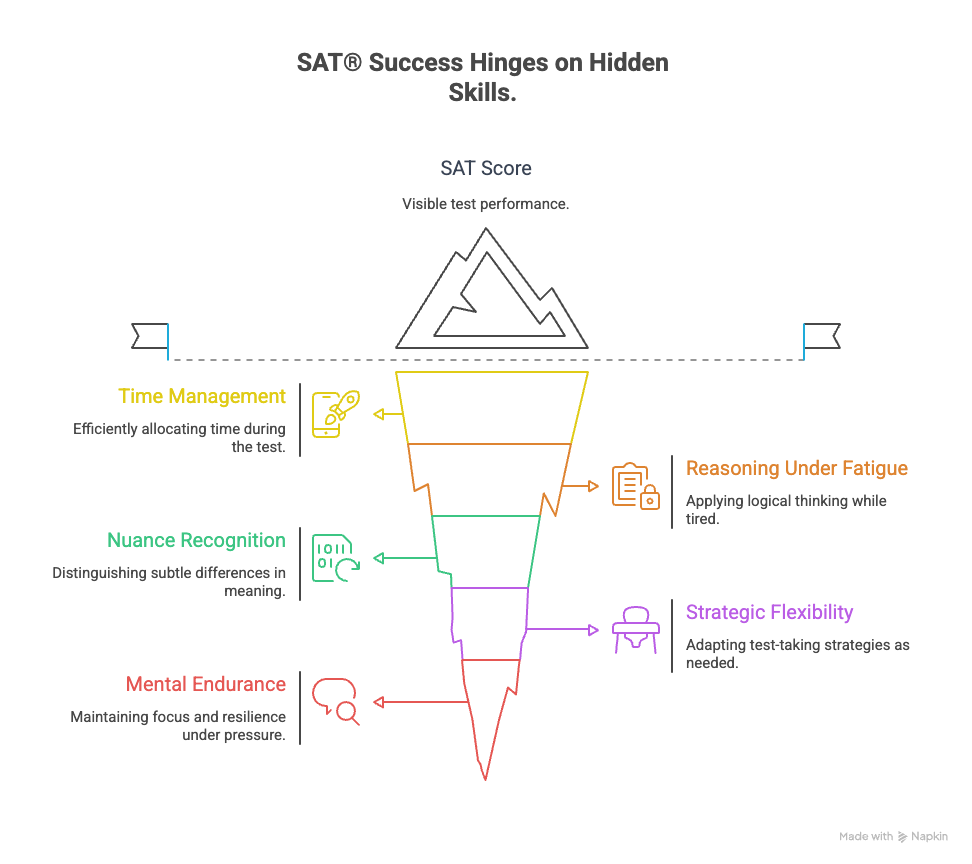We all know the student who flies through tests but freezes on exam day. Or the one who spends hours preparing but still struggles to focus. And then there’s the kid who doesn’t study much at all, yet somehow pulls it off at the last minute.
Same curriculum. Same test. Radically different results.
It’s tempting to chalk this up to discipline or talent, but that’s a narrow lens. What we’re actually seeing is a deeper truth: learning is never just cognitive. It’s behavioral. Emotional. Psychological. And it’s deeply personal.
This is why Sherpalai doesn’t start with content for SAT® prep. It starts with the learner.
Our 20 Sherpalai Learning Personas are the foundation of that philosophy. Patent pending, they didn’t come from guesswork or branding exercises. They emerged from an intense synthesis of psychological research, classroom observation, and real-world behavior patterns in teens, especially in the context of exam-taking.
Here’s the story behind them.
Why the "Average Student" is a Myth in SAT® Prep
Modern education systems are built for efficiency. That makes sense if you’re managing 30 students at a time. But the side effect is that we start optimizing for the median learner.
And the median learner doesn’t exist. You can find a few overlapping traits, but no real human fits that composite. The more we chase the average, the more we overlook the actual student in front of us who needs specific SAT® study strategies.
Sherpalai’s personas exist to surface that variation and to design around it, ensuring personalized SAT® prep.
The Research Behind Sherpalai's Learning Personas
Our persona framework sits at the intersection of multiple domains, all crucial for understanding SAT® prep and mental resilience:
- Self-efficacy theory (Albert Bandura, 1997): A student’s belief in their own capability directly affects effort, resilience, and performance on the SAT®.
- Implementation intentions (Peter Gollwitzer, 1999): Students are more likely to follow through on SAT® prep goals if they link them to concrete cues ("If X happens, I will do Y").
- Mindset theory (Carol Dweck, 2006): Growth-oriented students engage differently with SAT® setbacks than those with fixed mindsets.
- Cognitive-behavioral theory (Beck, 1976): Patterns of thought influence patterns of action, particularly under stress during SAT® study.
- Personality psychology: Drawing from the Big Five (McCrae & Costa, 1999) and MBTI-style typologies, we mapped traits that correlate with learning behavior for SAT® prep: conscientiousness, openness, neuroticism (anxiety), and extraversion/introversion.
We also referenced research on adolescent brain development (Casey, Jones, & Hare, 2008), particularly the prefrontal cortex's role in self-regulation, risk-taking, and goal-setting for students facing exams like the SAT®. In addition, we analyzed behavioral data and patterns observed across more than a decade of working with students preparing for high-stakes exams.
From this synthesis, 20 Sherpalai Learning Persona archetypes emerged. Not as boxes to constrain students, but as mirrors to better understand them and refine their SAT® study strategies.
What Makes a Sherpalai Persona Different for SAT® Prep?
Most persona systems in education (when they exist at all) focus on learning styles like visual, auditory, or kinesthetic. But research has consistently shown that learning styles aren’t strong predictors of SAT® success.
What matters more for SAT® prep and mental resilience?
- Emotional regulation
- Motivation structure
- Self-perception under pressure
- Behavior patterns around consistency, curiosity, and confidence
Sherpalai Learning Personas are built on these psychological levers. Each persona includes:
- Core strengths: Cognitive and emotional traits that drive progress.
- Key vulnerabilities: Typical traps that block learning or performance.
- Growth strategy: What this learner needs most to move forward.
So instead of saying, "You’re a visual learner," Sherpalai might say: "You’re a Tenacious Explorer. You spot patterns quickly, but sometimes hesitate to trust your instincts. Let’s work on building confidence through fast-recall challenges for your SAT® prep."
The shift is subtle but profound. It's not about how a student absorbs content. It's about how they engage with learning in the context of SAT® exam performance.
A Few Examples of Sherpalai Learning Personas (No Two Learners Alike)
- The Enthusiastic Wanderer: Curious, spontaneous, and full of energy. But often lacks SAT® study structure and gets easily distracted. Needs interactive, time-boxed learning and clear reward feedback.
- The Thoughtful Pathfinder: Reflective and calm under pressure. Prone to overthinking when doing SAT® practice. Benefits from decisive practice methods and progress tracking.
- The Driven Trailblazer: Goal-oriented and persistent. But can become tunnel-visioned and anxious. Needs SAT® prep routines that balance ambition with rest to prevent burnout.
- The Calm Navigator: Steady, resilient, and unflappable. Yet sometimes avoids hard truths about weak SAT® areas. Needs gentle confrontation with growth opportunities.
None of these profiles is good or bad. They’re starting points. Contextual snapshots. And because Sherpalai updates its coaching logic as the student progresses, these personas aren’t static labels. They evolve, leading to continuous improvement in SAT® study strategies.
The Real Power: Adaptive Teaching and Student Reflection for SAT® Prep
Assigning a persona isn’t the end goal. It’s a lens. A way to:
- Guide adaptive instruction: Sherpalai uses persona data to vary tone, question types, challenge level, and engagement strategies for personalized SAT® prep.
- Spark self-awareness: When students read their persona summaries, the most common response is, "This sounds just like me." That spark of recognition builds agency and mental resilience.
- Improve consistency: Because each persona includes motivational hooks, Sherpalai can tailor nudges, challenges, and reminders to what actually drives that student's SAT® study.
Over time, this leads to measurable gains not just in SAT® scores, but in confidence and discipline.





